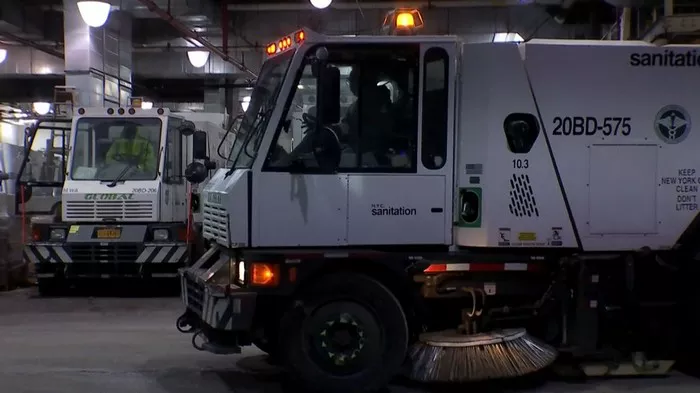Parking in urban areas can be a challenging task, especially when navigating through various parking regulations and street sweeping schedules. Many city dwellers often wonder about the rules surrounding parking after the street sweeper has cleaned the street. This article aims to clarify these regulations and provide guidance on how to navigate them effectively.
See Also: What You Need to Know About Street Sweepers
Understanding Street Sweeping Schedules
Cities and municipalities implement street sweeping programs to maintain cleanliness and hygiene on public roads. These programs involve regular cleaning of streets to remove debris, litter, and other pollutants that accumulate over time. Street sweeping schedules vary widely depending on the location, with some areas sweeping weekly, bi-weekly, or even monthly.
Parking Restrictions During Street Sweeping
One of the primary challenges for drivers is understanding when they can and cannot park on streets designated for sweeping. To facilitate effective street cleaning, parking restrictions are often enforced during specified hours when the sweeper is scheduled to pass through. These restrictions typically require vehicles to be moved off the street to allow for thorough cleaning.
Timing and Duration of Parking Restrictions
Parking restrictions are usually in effect for a set period before and during street sweeping operations. This timeframe ensures that the sweeper can clean the entire street without obstruction. Commonly, parking is prohibited for a few hours on the designated day of sweeping, typically early in the morning or late at night when traffic is minimal.
Legal Implications of Parking Violations
Parking violations related to street sweeping can result in fines or even towing of vehicles. Municipalities enforce these regulations to maintain the effectiveness of street cleaning operations and ensure public safety. It is essential for drivers to be aware of these regulations to avoid penalties and inconvenience.
Can I Park After the Sweeper Passes?
Once the street sweeper has completed its cleaning route and the designated sweeping hours have passed, drivers often wonder if it is safe to park on the street again. The answer to this question varies depending on local regulations and practices. In many cases, parking is permitted once the sweeping operation is complete and the sweeping restrictions have been lifted.
Verifying Sweeping Completion
To determine if it is safe to park after the sweeper passes, drivers should look for indicators such as:
Signs and Notifications: Many cities post signs indicating the hours of street sweeping and when parking restrictions are lifted.
Observation of Sweeper: Observing the sweeper’s completion of its route can provide visual confirmation that cleaning operations have ceased.
Check Local Guidelines: Consulting local parking regulations or municipal websites can provide specific information on when parking restrictions end after sweeping.
Common Misconceptions
There are several misconceptions regarding parking after the sweeper passes. It is important to clarify these to avoid confusion and potential violations:
Immediate Parking: Some drivers mistakenly believe they can park immediately after the sweeper passes. It is crucial to wait until all sweeping operations are officially concluded and any temporary parking restrictions are lifted.
Overnight Parking: Assuming that parking restrictions only apply during the day, some drivers may inadvertently violate regulations by parking overnight when sweeping may occur in the early hours of the morning.
Tips for Navigating Parking Regulations
Navigating parking regulations related to street sweeping requires attention to detail and awareness of local guidelines. Here are some tips to help drivers comply with these regulations effectively:
Mark Your Calendar: Keep track of street sweeping schedules in your area and mark them on your calendar to avoid parking violations.
Alternative Parking Options: Identify alternative parking locations or garages where you can park during sweeping hours to avoid penalties.
Community Resources: Utilize community resources such as neighborhood forums or apps that notify residents of street sweeping schedules and parking restrictions.
Conclusion
Understanding when you can park after the street sweeper passes involves familiarity with local regulations and adherence to designated parking restrictions. By staying informed about street sweeping schedules, observing posted signs, and verifying when sweeping operations conclude, drivers can navigate parking regulations effectively and avoid fines or towing. Remember, compliance with these regulations not only ensures cleanliness but also contributes to safer and more orderly urban environments.
In conclusion, while parking regulations related to street sweeping may seem complex, adherence to these guidelines is essential for maintaining city cleanliness and avoiding penalties. By understanding the timing of sweeping operations and when parking restrictions are lifted, drivers can ensure that they park responsibly and contribute to the overall cleanliness and efficiency of urban spaces.
FAQs
Can you park after the street sweeper passes in NYC?
In New York City, alternate side parking rules are strictly enforced. Even after the street sweeper passes, you must wait until the designated sweeping hours are officially over before parking your vehicle. The city enforces these rules to ensure streets remain clear for thorough cleaning, so always adhere to the posted signs and schedules to avoid fines.
Can I park after the street sweeper passes in Boston?
In Boston, you can generally park after the street sweeper passes, but only once the designated sweeping hours have ended. The city’s street sweeping schedules and parking restrictions are clearly marked on street signs. Ensure you wait until the restricted hours are officially over to avoid any potential violations or fines.
How long does a street sweeper last?
The duration a street sweeper spends cleaning a street can vary based on several factors, including the length of the street, the amount of debris, and the type of sweeper used. Typically, a street sweeper can clean a block in about 5-10 minutes. However, the entire process for a street or neighborhood can take several hours, depending on the specific conditions and the area’s size.

